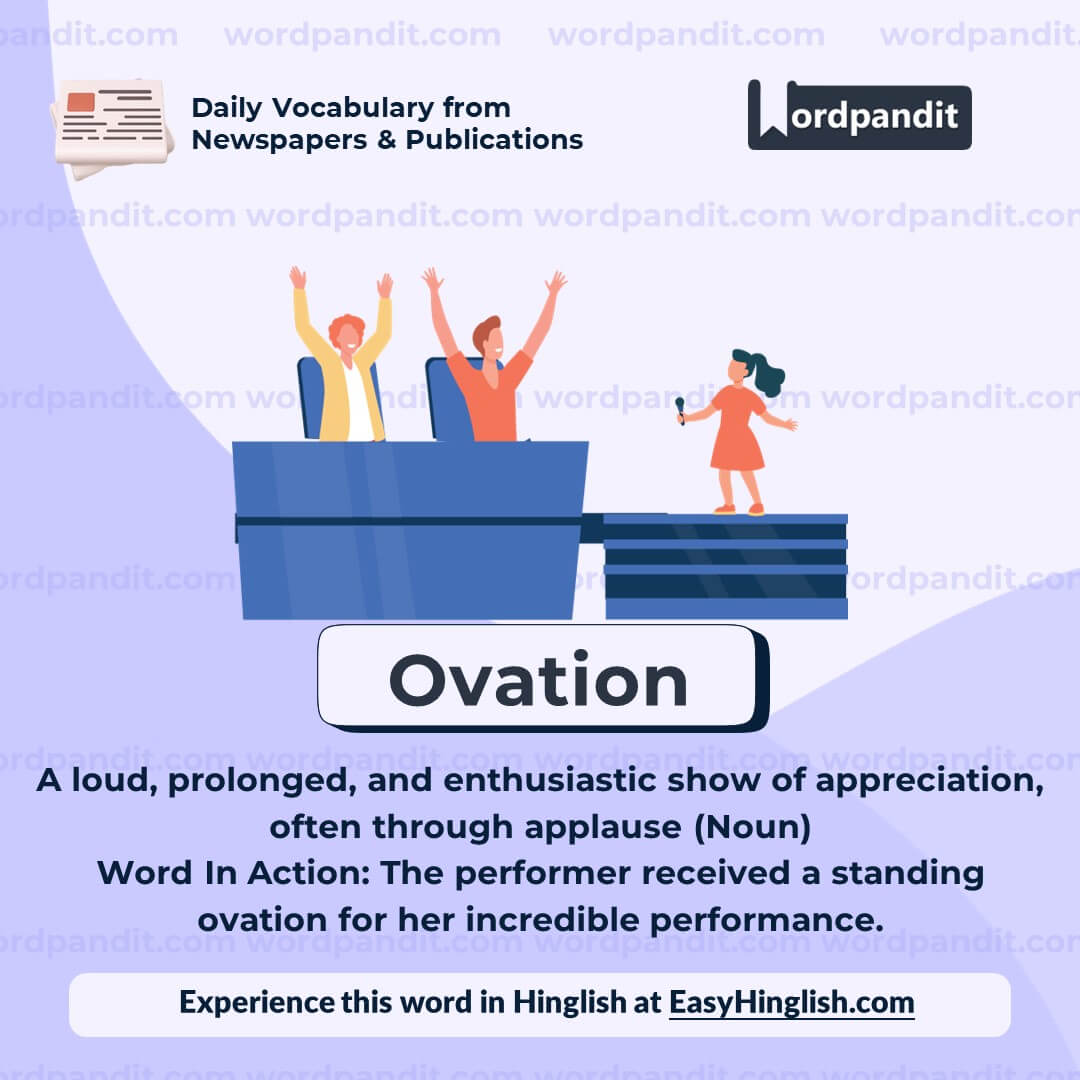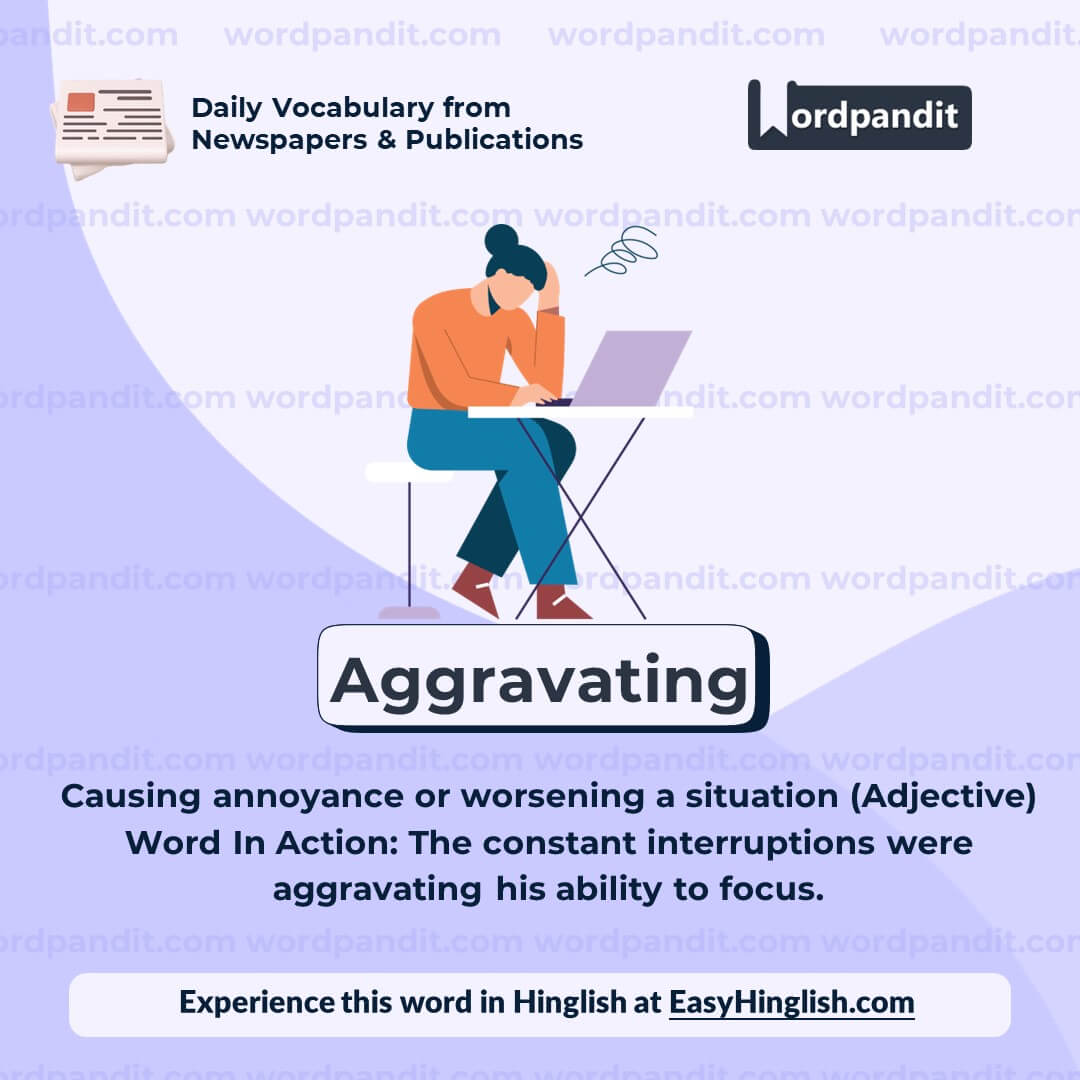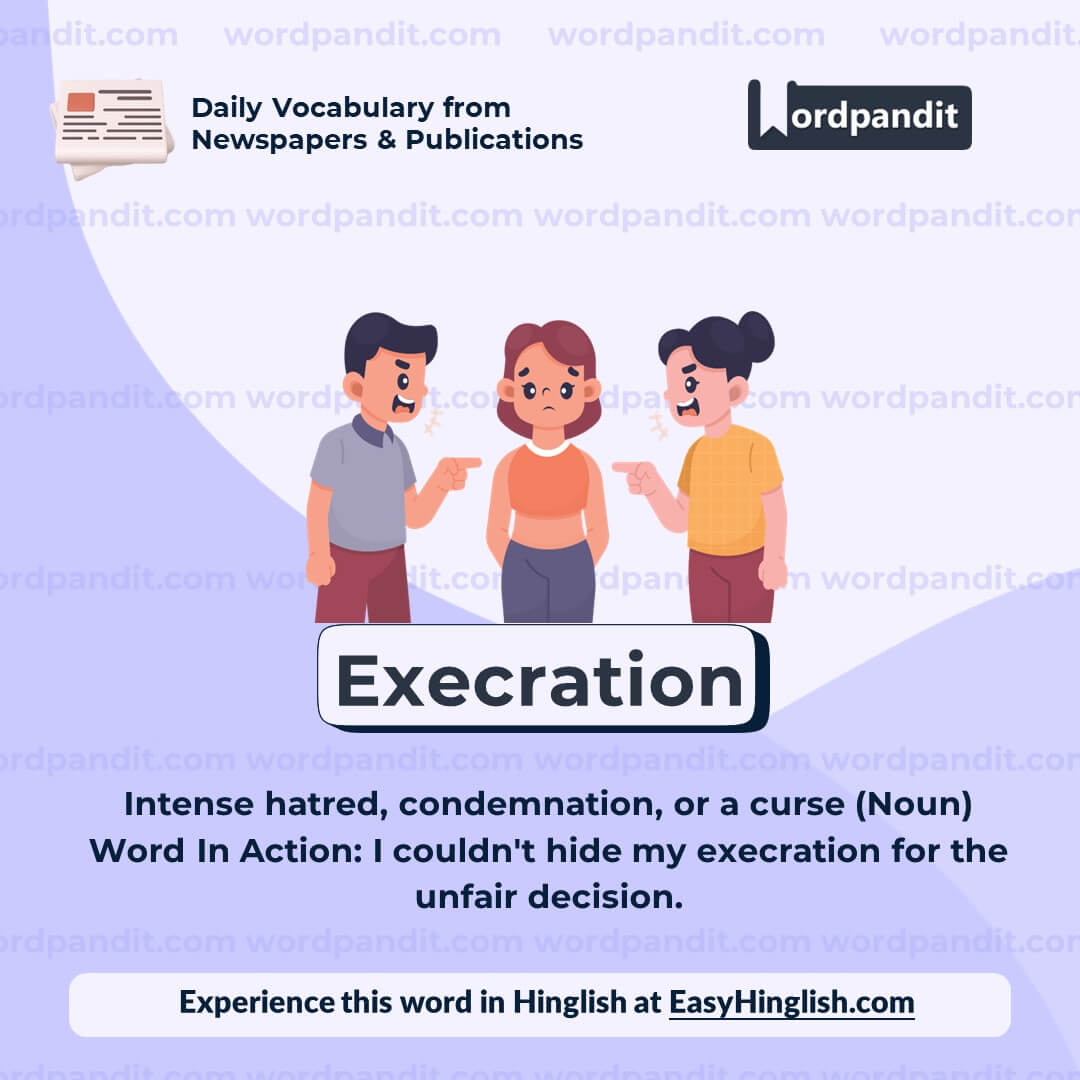Daily Vocabulary from Indian Newspapers and Publications
Welcome to Wordpandit’s Indian Vocabulary Hub
At Wordpandit, we understand the importance of staying rooted in the local context while expanding your language skills. This section focuses on enriching your vocabulary with words and phrases drawn from India’s leading newspapers and publications, ensuring you're learning vocabulary that is practical, relevant, and uniquely Indian.
Why Indian Sources Matter
We believe that the best way to master any language is by immersing yourself in local content. That’s why we carefully curate vocabulary from top Indian publications, including:
- The Hindu
- The Times of India
- The Economic Times
- Hindustan Times
- Live Mint
- The Indian Express
- And many others...
Stay Updated, Stay Relevant
With daily updates from Indian news sources, you’ll be consistently learning words that reflect the trends and shifts in Indian society and culture. Our focus is to provide vocabulary that enhances your understanding of the language in an Indian context.
How Wordpandit Supports Your Goals
Whether you’re preparing for exams, aiming to improve your professional communication, or simply want to stay connected with the latest Indian vocabulary, Wordpandit is here to guide you every step of the way.
Learn with a Practical Approach
Our interactive learning methodology includes real-world examples, engaging activities, and context-specific usage to ensure that every word becomes part of your active vocabulary.
Dive into Indian Vocabulary Today!
Why Choose Wordpandit?
Practical Learning: Focus on words you'll actually encounter in real-world reading, enhancing your comprehension and communication skills.
Diverse Content: From current affairs to scientific breakthroughs, our varied sources expose you to vocabulary across multiple domains.
Effortless Integration: Make Wordpandit a part of your daily routine. Just a few minutes each day can significantly boost your lexicon over time.
Your Path to Vocabulary Mastery
- Visit our Daily Vocabulary section regularly
- Explore new words and their usage in context
- Practice incorporating these words into your own writing and speech
- Track your progress as your vocabulary expands
Start Your Journey Today
Embark on your vocabulary enhancement journey with Wordpandit. By consistently engaging with our daily posts, you'll build a robust vocabulary that serves you well in academic, professional, and personal contexts.
Remember, a word a day keeps linguistic limitations at bay. Make Wordpandit your daily companion in the quest for vocabulary excellence!
WORD-1: Ovation
Context:
"The attendees of this conference gave a 10-minute standing ovation to a team standing on the stage." - The Hindu
Explanatory Paragraph:
"Ovation" refers to an enthusiastic display of public appreciation, usually shown through prolonged clapping and cheering. It is often given to recognize exceptional performances, achievements, or contributions. A standing ovation, in particular, signifies the highest level of admiration and respect.
Meaning: A loud, prolonged, and enthusiastic show of appreciation, often through applause. (Noun)
Pronunciation: oh-VAY-shun
Difficulty Level: ⭐⭐⭐ Intermediate
Etymology: Derived from the Latin word "ovatio," meaning "rejoicing" or "triumphal entry." In ancient Rome, an ovation was a lesser form of a military triumph.
Synonyms & Antonyms:
Synonyms: Applause, acclaim, cheer, tribute, praise
Antonyms: Booing, criticism, jeering, disapproval
Usage Examples:
- The Nobel Prize winner received a standing ovation from the audience.
- Her breathtaking performance on the violin earned her a thunderous ovation.
- At the end of the speech, the crowd gave the leader an ovation that lasted for several minutes.
- The film’s emotional ending moved the audience to give a spontaneous ovation.
Cultural Reference:
"At the 1992 Oscars, Charlie Chaplin received a 12-minute standing ovation, the longest in Academy Awards history." - Hollywood Archives
Think About It:
Why do we use standing ovations as a sign of deep appreciation? Can you think of a moment when an ovation felt truly deserved?
Quick Activity:
Write a short paragraph about a performance or speech that you believe deserved an ovation. Explain why it was so impactful.
Memory Tip:
Think of the word "Ovation" as "Overwhelming Applause" – both start with 'O' and signify great appreciation.
Real-World Application:
"Ovation" is widely used in entertainment, sports, and politics. It’s a mark of outstanding achievement and can be seen at concerts, speeches, and performances where audiences express their admiration.
WORD-2: Malignant
Context:
"Blood sugar levels keep rising to stimulate the emergence of free radicals, which can lead to malignant tumors or cancer." - The Hindu
Explanatory Paragraph:
The word "malignant" is commonly used in medical contexts to describe harmful, aggressive, or cancerous growths that tend to spread and worsen over time. Beyond medicine, it can also describe anything dangerous, destructive, or evil in nature, such as a malignant influence or a malignant force in society.
Meaning: Harmful, aggressive, and dangerous, especially in relation to diseases like cancer. (Adjective)
Pronunciation: muh-LIG-nuhnt
Difficulty Level: ⭐⭐⭐ Intermediate
Etymology: Derived from the Latin word "malignus," meaning "evil" or "harmful," which comes from "malus" (bad) and "gignere" (to produce).
Synonyms & Antonyms:
Synonyms: Cancerous, deadly, destructive, harmful, malevolent
Antonyms: Benign, harmless, gentle, beneficial
Usage Examples:
- The doctors confirmed that the tumor was malignant and required immediate treatment.
- Social media can sometimes spread malignant rumors that harm people's reputations.
- Despite early treatment, the malignant cells continued to spread aggressively.
- His malignant intentions were evident when he tried to sabotage the project.
Cultural Reference:
"Malignant" is frequently used in medical dramas and news reports discussing cancer treatment. The phrase "malignant tumor" appears in various documentaries and health awareness campaigns worldwide.
Think About It:
Why do you think the word "malignant" is used both in medical and non-medical contexts? Can you think of a situation where something non-physical could be described as malignant?
Quick Activity:
Write a short paragraph using the word "malignant" in both a medical and non-medical sense.
Memory Tip:
Think of "malignant" as "mal" (which means bad in Latin) + "gnant" (similar to generate). Malignant generates bad effects, like harmful tumors.
Real-World Application:
"Malignant" is a crucial term in medicine, particularly in cancer diagnosis. Outside of healthcare, it is often used in psychology, politics, and social discussions to describe harmful or destructive behaviors and influences.
WORD-3: Thesis
Context:
"While working on a thesis for my graduation, I found a new way to eliminate diabetes; the current method is discussed by many people." - The Hindu
Explanatory Paragraph:
A "thesis" is a long, well-researched document or argument that presents an individual's findings or perspective on a specific topic. It is often written as a requirement for higher academic degrees, such as a master's or PhD. In a broader sense, "thesis" can also refer to a central idea or argument that someone is trying to prove.
Meaning: A long academic paper presenting original research or a central argument. (Noun)
Pronunciation: THEE-sis
Difficulty Level: ⭐⭐⭐ Intermediate
Etymology: Derived from the Greek word "thesis," meaning "a proposition" or "something put forth."
Synonyms & Antonyms:
Synonyms: Dissertation, argument, proposition, theory, hypothesis
Antonyms: Fact, certainty, proof, reality
Usage Examples:
- She submitted her thesis on artificial intelligence after two years of research.
- His thesis argues that climate change is accelerating due to human activities.
- Before writing an essay, it’s essential to have a clear thesis statement.
- The professor challenged the student's thesis, asking for more supporting evidence.
Cultural Reference:
"In academia, writing a thesis is a crucial milestone for master's and PhD students. Some of the most influential scientific discoveries, such as Einstein's early work on relativity, were first proposed in academic theses."
Think About It:
Why do you think writing a thesis is considered an important step in higher education? How does it contribute to knowledge and research?
Quick Activity:
Think of a topic you are passionate about. Write a one-sentence thesis statement summarizing your viewpoint on that topic.
Memory Tip:
Remember "Thesis" as "The + Sis"—imagine a sister (Sis) making a long argument (The) to prove a point!
Real-World Application:
"Thesis" is widely used in academics, but also in debates, essays, and presentations. A strong thesis statement helps in structuring a well-reasoned argument in writing and speech.
WORD-4: Aggravating
Context:
"It can be extremely aggravating." - The Hindu
Explanatory Paragraph:
The word "aggravating" describes something that causes annoyance, frustration, or makes a situation worse. If someone repeatedly interrupts you while you’re trying to concentrate, you might find it aggravating. The word can be used for both people and situations that intensify irritation.
Meaning: Causing annoyance or worsening a situation (Adjective)
Pronunciation: AG-ruh-vay-ting
Difficulty Level: ⭐⭐⭐ Intermediate
Etymology: Derived from the Latin word "aggravare," meaning "to make heavier or worse," from "ad-" (to) + "gravare" (to weigh down).
Synonyms & Antonyms:
Synonyms: Irritating, annoying, exasperating, infuriating
Antonyms: Soothing, calming, relieving, alleviating
Usage Examples:
- The long wait at the doctor’s office was extremely aggravating.
- His constant interruptions during the meeting were aggravating everyone.
- The heavy traffic only aggravated my frustration on a busy Monday morning.
- Not getting a clear answer to my question was very aggravating.
Cultural Reference:
"Aggravating circumstances" is a legal term used to describe factors that make a crime more severe, such as premeditation or cruelty.
Think About It:
What are some situations in your daily life that you find particularly aggravating? How do you usually deal with them?
Quick Activity:
Write a short paragraph about a time when you felt aggravated. Try to use "aggravating" and "aggravate" correctly in your writing.
Memory Tip:
Think of "aggravating" as "adding gravity" to a problem—something that makes an issue feel heavier or more frustrating.
Real-World Application:
"Aggravating" is useful in both casual and professional settings. You can use it to describe frustrating customer service, a difficult situation at work, or even small everyday annoyances.
WORD-5: Execration
Context:
"A protester's furious execration of the police might end up getting her arrested." - The Hindu
Explanatory Paragraph:
The word "execration" refers to intense hatred, condemnation, or a curse directed at someone or something. It is often used in situations where people express extreme anger or disgust, particularly in protests, arguments, or criticisms. Historically, the term was associated with invoking curses upon enemies.
Meaning: Intense hatred, condemnation, or a curse. (Noun)
Pronunciation: ek-suh-KRAY-shun
Difficulty Level: ⭐⭐⭐ Advanced
Etymology: Derived from the Latin word "execratio," meaning "a curse" or "a strong expression of hatred," from "ex-" (out) and "sacrare" (to make sacred or to curse).
Synonyms & Antonyms:
Synonyms: Condemnation, denunciation, curse, malediction, vilification
Antonyms: Praise, blessing, admiration, approval
Usage Examples:
- The dictator’s policies drew execration from human rights activists worldwide.
- The fans' execration of the referee's decision led to chaos in the stadium.
- In ancient times, people believed that a king’s execration could bring misfortune.
- His betrayal of his comrades earned him their eternal execration.
Cultural Reference:
"In Shakespeare's plays, characters often invoke execration upon their enemies, using powerful language to express their hatred and call for misfortune." - Literary Studies
Think About It:
Do you think execration is an effective way to express discontent, or does it only lead to further conflicts?
Quick Activity:
Think of a famous historical figure who faced widespread execration. Write a short paragraph explaining why.
Memory Tip:
Think of "Execration" as "Ex + creation"—as if you are creating something negative "out" of anger, like a curse or strong condemnation.
Real-World Application:
The word "execration" is often seen in literature, political speeches, and historical contexts where people strongly criticize injustice, betrayal, or corruption.



















